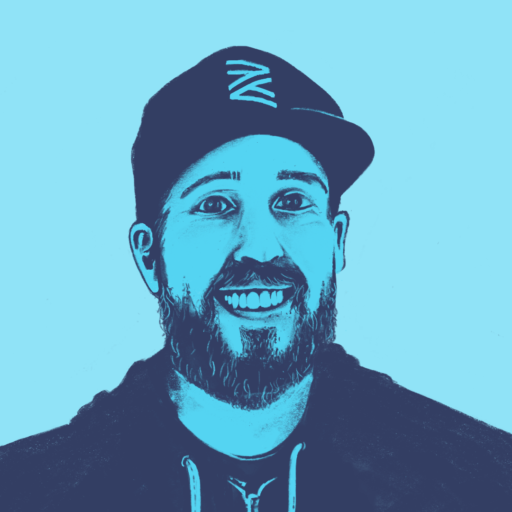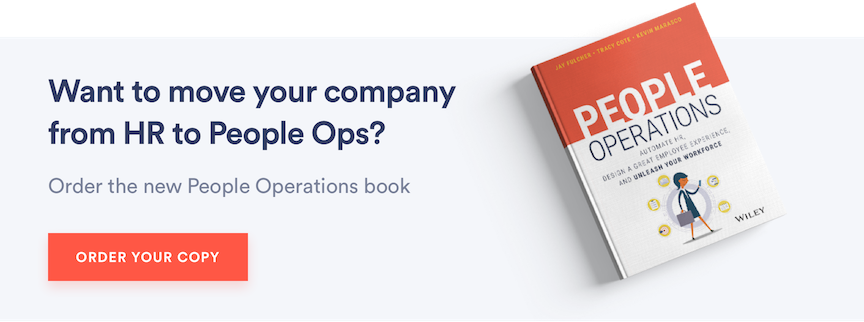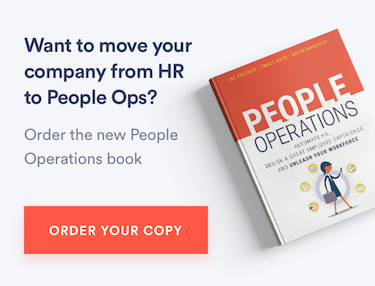
Subscribe on:
Q&A: What’s the advantage of People Ops vs. HR?
People Operations not only a fast-growing career option, it is a change in philosophy, practice and results that is good for business. And it’s great for small business, which is nimbler and better able to adopt and advance it than bigger business. Just like Finance, Sales and Marketing functions have all been operationalized for the better, so too should your people functions.
People are a company’s greatest asset, expense, and competitive advantage. So why is the function that oversees a workforce traditionally seen as, at worst, a “necessary evil?”
In this episode of POPS!, Zenefits Chief Marketing Officer Kevin Marasco explains why successful companies are shifting from “HR administration” to “People Operations” and the four key factors that have influenced this shift in the new world of work.
In this Q&A, you’ll hear:
- [00:16-01:04] The definition of People Operations
- [01:05-01:51] The original purpose of HR
- [01:54-03:38] People Ops is a philosophy, a discipline, and a function
- [03:39-04:41] The four key factors to shift to People Ops
- [04:42-06:02] What People Ops is not
POPS Star Bio
Kevin Marasco’s first job was mowing lawns. He became intrigued with small business when his dad gave up a big corporate job to run a small business and have more time with his family. Today as the CMO at Zenefits, he’s parlayed 20 years of experience growing small businesses at the intersection of tech and people operations into market movers with big impact. He knows a lot about movement too: Kevin is an ultramarathoner, with a side hustle in sports tech. It’s not uncommon to find him out on 30-mile training runs with his two preschoolers in a jog stroller.
After you listen:
Check out this People Ops Maturity Guide, for more context.

Transcript
Didi D’Errico: So what exactly is people ops? Is it really different from HR? To help answer this question, here’s Chief Marketing Officer, Kevin Marasco, at Zenefits.
Kevin Marasco: People operations is a people-centric approach to business focused on automating HR administration. Designing a great employee experience and culture that unlocks workforce productivity and using data to drive decisions and business outcomes.
On one hand, people have never been more closely linked to the success of a business, any company’s greatest asset expense, and source of competitive advantage yet at the same time. The function that oversees workforce practices is traditionally one of the least operational. When you think about being integrated into business strategy, outcome-oriented data-driven and tech-forward, and in many cases, the HR scene is very tactical and reactionary.
And at worst is seen as a necessary evil or overhead or hassle. And a lot of this has to do with history. The concept of HR was born over a century ago during the industrial age. This was a time where humans were basically treated like resources or any other replaceable widget on the assembly line.
The purpose of HR was to oversee workforce and union policies, basically the policy police. And it’s no wonder a lot of executives and people don’t love the idea. We have HR now, all of this was over a hundred years ago. Completely different time. Think about it. Everything about the workforce has changed the workplace significantly evolved and workstyles are radically changing, all completely new.
It’s a completely new world. And the most successful companies are moving from HR administration to people, operations. It’s all about the new world of work. There are three components to people ops the first it’s a philosophy. A point of view on a way to do things, including the knowledge, the best practices and academic study of the new methods.
Second, it’s a discipline. It’s a craft, just like any other craft sales, marketing, and finance, dedicated to the strategies and execution of the new philosophy and methods. And third it’s a function as a department or role within an organization with a defined set of responsibilities. Focus on implementing.
The philosophy and manifesting the discipline and has ultimate responsibility for the people experience inside an organization. Now, this can look like a variety of things, depending on the stage and complexity of a company. Take a small business. For example, typically it’s the small business owner, the CEO, CFO, or an operational leader that owns.
The people ops function along with all the other functions they’re wearing multiple hats. And in this case, the benefit to people ops is a new approach. Instead of investing valuable time, resources, and energy, or building a traditional HR team, you automate that work through technology, and then you reinvest those valuable time and resources into things.
That’ll move the needle more for the business, things like investing and the customer experience, sales marketing, and growing the business. Now. As an organization grows and scales, you are going to want a dedicated people ops function, and it can have a variety of names. We see people, operations, people in culture, people on the talent that people experience the name matters less than the new approach.
And it’s all about implementing the new philosophy, the new methods, and this new discipline in a better way. That empowers the new world of work. There are four key factors in the shift from HR administration to people operations. The first shift is from manual to automation using technology instead of humans for repetitive tasks, like data entry processing and reporting.
And the second shift is from guesswork to data capturing, analyzing, and sharing data-driven insights about the workforce instead of relying on gut instinct and anecdotes. The third shift is from a cost center to profit center, optimizing for workforce productivity, and results. Instead of expense and efficiency.
So instead of spending time and energy, focusing on time and costs, focusing on revenue and profits, things that directly linked to business outcomes, the fourth and final shift is from management to experience treating the employee experience like the customer experience and optimizing that across the entire employee life cycle to create a competitive advantage.
So now that we’ve talked about what people operations is, let’s also talk about what it is. Not people ops. Isn’t a fancy new name for traditional human resources. As we discussed earlier, people ops is more than a new title. It’s a new philosophy, a new discipline in a new function that displaces the need for traditional HR.
It’s also not a Silicon Valley fat now like a lot of innovations high-growth tech companies have been some of the early adopters of people, ops principles. And this makes sense. People in culture are critical and fiercely competitive in any industry, but especially tech, but this is not about kale smoothies and ping-pong companies in every industry are embracing people, operations methods.
And finally, people ops isn’t just a fancy new technology. It is true to automating mundane and repetitive tasks. It is key to unlocking the time, energy, necessary to focus on more important work. It’s also key to capturing data, which is imperative to measuring progress and delivering meaningful business insights.
However, people ops is much bigger than just the technology. It’s an entirely new approach. People operations are the future. It’s a paradigm shift. It’s a new way of thinking. It’s a new approach for companies of all sizes and industries. The benefits are significant and they’re real. It’s a better way for business leaders.
Employees and people teams to empower their greatest advantage, their people.
Didi D’Errico: Do you have a question for our experts? Click the link in the show notes, or if you’ve got other ideas and feedback about our show, send them to [email protected]
Previous Episodes
Q&A: How do I give feedback to managers with more seniority than me?
Q&A: It’s not the years, it’s the mileage
Q&A: Are we supporting the basic human needs of our workforce?

About The People Ops Podcast
Every week, we share the decisions, struggles, and successes for keeping up with an evolving workforce and a changing workplace. No matter if you’ve been in HR or are just getting started, this combination of transformational stories with actionable ideas, as well as context on hot issues, keeps you up-to-date while answering the questions you didn’t even know you had.
Oh, and you know what they say about all work and no play? We tossed in a little levity to keep it real. Lessons, answers, and humor: everywhere you listen to podcasts.


Best-in-class remote teams will use best-in-class technology.
Zenefits mobile HR platform makes it easier to communicate with staff, onboarding new hires, pay employees, and manage any HR task from any home office.








